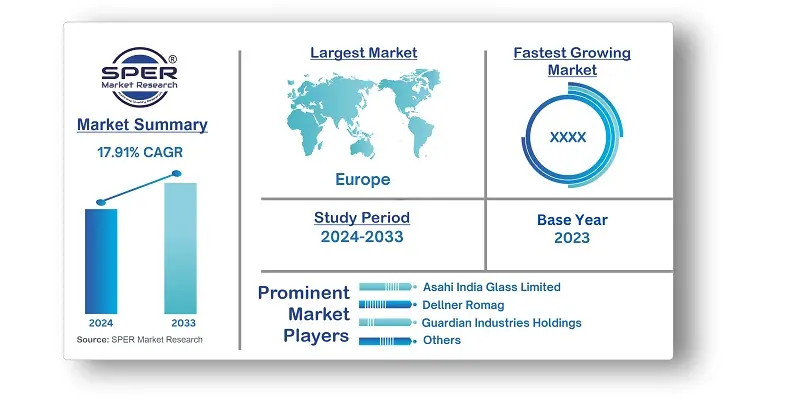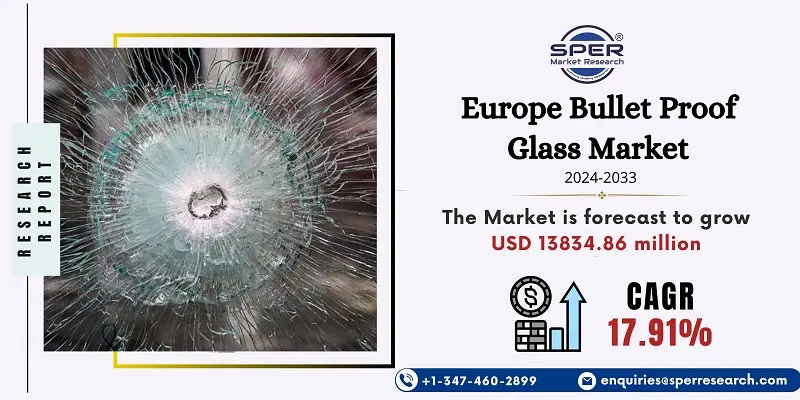
Europe Bullet Proof Glass Market Growth, Size, Trends, Demand, Revenue and Future Outlook
Europe Bullet Proof Glass Market Size- By Material, By End User, By Application, By Security Levels- Regional Outlook, Competitive Strategies and Segment Forecast to 2033
| Published: Aug-2024 | Report ID: CHEM2483 | Pages: 1 - 157 | Formats*: |
| Category : Chemical & Materials | |||


| Report Metric | Details |
| Market size available for years | 2020-2033 |
| Base year considered | 2023 |
| Forecast period | 2024-2033 |
| Segments covered | By Material, By End-User, By Application, By Security Levels |
| Regions covered | Germany, France, U.K, Italy, Spain, Rest of Europe |
| Companies Covered | Asahi India Glass Limited, Dellner Romag, Guangzhou Topo Glass Co, Ltd, Guardian Industries Holdings, Nippon Sheet Glass Co., Ltd., P.P.G Industries, Inc, Qingdao Tsing Glass Co. Limited, Taiwan Glass Industry Corporation, Xinyi Glass Holdings Limited. |
- Government and Public Sector
- Commercial Real Estate
- Financial Institutions
- Luxury and High-Security Vehicles
- Healthcare Facilities
- Educational Institutions
- Retail and Hospitality Sector
- Defense and Military
- Transport and Logistics Companies
- Residential Sector
| By Material: |
|
| By End-User: |
|
| By Application: |
|
| By Security Levels: |
|
- Europe Bullet Proof Glass Market Size (FY’2024-FY’2033)
- Overview of Europe Bullet Proof Glass Market
- Segmentation of Europe Bullet Proof Glass Market by Material (Acrylic, Laminated Glass, Polycarbonate, Glass Clad Polycarbonate, Ballistic Insulated Glass, Others)
- Segmentation of Europe Bullet Proof Glass Market by End-User (Automotive, Military, Construction, Banking and Finance, Others)
- Segmentation of Europe Bullet Proof Glass Market by Application (Defense and V.I.P. Vehicles, Government and Law Enforcement, Cash-In-Transit Vehicles, Commercial Buildings, A.T.M. Booths and Teller Stations, Others)
- Segmentation of Europe Bullet Proof Glass Market by Security Levels (Level-1, Level-2, Level-3, Level-4 to 8, Others)
- Statistical Snap of Europe Bullet Proof Glass Market
- Expansion Analysis of Europe Bullet Proof Glass Market
- Problems and Obstacles in Europe Bullet Proof Glass Market
- Competitive Landscape in the Europe Bullet Proof Glass Market
- Impact of COVID-19 and Demonetization on Europe Bullet Proof Glass Market
- Details on Current Investment in Europe Bullet Proof Glass Market
- Competitive Analysis of Europe Bullet Proof Glass Market
- Prominent Players in the Europe Bullet Proof Glass Market
- SWOT Analysis of Europe Bullet Proof Glass Market
- Europe Bullet Proof Glass Market Future Outlook and Projections (FY’2024-FY’2033)
- Recommendations from Analyst
1.1. Scope of the report1.2. Market segment analysis
2.1. Research data source2.1.1. Secondary Data2.1.2. Primary Data2.1.3. SPER’s internal database2.1.4. Premium insight from KOL’s2.2. Market size estimation2.2.1. Top-down and Bottom-up approach2.3. Data triangulation
4.1. Driver, Restraint, Opportunity and Challenges analysis4.1.1. Drivers4.1.2. Restraints4.1.3. Opportunities4.1.4. Challenges4.2. COVID-19 Impacts of the Europe Bullet Proof Glass Market.
5.1. SWOT Analysis5.1.1. Strengths5.1.2. Weaknesses5.1.3. Opportunities5.1.4. Threats5.2. PESTEL Analysis5.2.1. Political Landscape5.2.2. Economic Landscape5.2.3. Social Landscape5.2.4. Technological Landscape5.2.5. Environmental Landscape5.2.6. Legal Landscape5.3. PORTER’s Five Forces5.3.1. Bargaining power of suppliers5.3.2. Bargaining power of buyers5.3.3. Threat of Substitute5.3.4. Threat of new entrant5.3.5. Competitive rivalry5.4. Heat Map Analysis
6.1. Europe Bullet Proof Glass Market Manufacturing Base Distribution, Sales Area, Product Type6.2. Mergers & Acquisitions, Partnerships, Product Launch, and Collaboration in Europe Bullet Proof Glass Market
7.1. Europe Bullet Proof Glass Market Size, Share and Forecast, By Material, 2020-20267.2. Europe Bullet Proof Glass Market Size, Share and Forecast, By Material, 2027-20337.3. Acrylic7.4. Laminated Glass7.5. Polycarbonate7.6. Glass Clad Polycarbonate7.7. Ballistic Insulated Glass7.8. Others
8.1. Europe Bullet Proof Glass Market Size, Share and Forecast, By End-User, 2020-20268.2. Europe Bullet Proof Glass Market Size, Share and Forecast, By End-User, 2027-20338.3. Automotive8.4. Military8.5. Construction8.6. Banking and Finance8.7. Others
9.1. Europe Bullet Proof Glass Market Size, Share and Forecast, By Application, 2020-20269.2. Europe Bullet Proof Glass Market Size, Share and Forecast, By Application, 2027-20339.3. Defense and V.I.P Vehicles9.4. Government and Law Enforcement9.5. Cash-In-Transit Vehicles9.6. Commercial Buildings9.7. A.T.M Booths and Tellers Stations9.8. Others
10.1. Europe Bullet Proof Glass Market Size, Share and Forecast, By Application, 2020-202610.2. Europe Bullet Proof Glass Market Size, Share and Forecast, By Application, 2027-203310.3. Level-110.4. Level-210.5. Level 310.6. Level 4 to 810.7. Others
11.1. Europe Bullet Proof Glass Market Size and Market Share
12.1. Europe Bullet Proof Glass Market Size and Market Share By Region (2020-2026)12.2. Europe Bullet Proof Glass Market Size and Market Share By Region (2027-2033)12.2.1. France12.2.2. Germany12.2.3. Italy12.2.4. Spain12.2.5. United Kingdom12.2.6. Rest of Europe
13.1. ASAHI INDIA GLASS LIMITED13.1.1. Company details13.1.2. Financial outlook13.1.3. Product summary13.1.4. Recent developments13.2. DELLNER ROMAG13.2.1. Company details13.2.2. Financial outlook13.2.3. Product summary13.2.4. Recent developments13.3. GUANGZHOU TOPO GLASS CO, LTD13.3.1. Company details13.3.2. Financial outlook13.3.3. Product summary13.3.4. Recent developments13.4. GUARDIAN INDUSTRIES HOLDINGS13.4.1. Company details13.4.2. Financial outlook13.4.3. Product summary13.4.4. Recent developments13.5. NIPPON SHEET GLASS CO, LTD13.5.1. Company details13.5.2. Financial outlook13.5.3. Product summary13.5.4. Recent developments13.6. P.P.G. INDUSTRIES, INC13.6.1. Company details13.6.2. Financial outlook13.6.3. Product summary13.6.4. Recent developments13.7. QINGDAO TSING GLASS CO LIMITED,13.7.1. Company details13.7.2. Financial outlook13.7.3. Product summary13.7.4. Recent developments13.8. TAIWAN GLASS INDUSTRY CORPORATION13.8.1. Company details13.8.2. Financial outlook13.8.3. Product summary13.8.4. Recent developments13.9. XINYI GLASS HOLDINGS LIMITED13.9.1. Company details13.9.2. Financial outlook13.9.3. Product summary13.9.4. Recent developments13.10. Others
SPER Market Research’s methodology uses great emphasis on primary research to ensure that the market intelligence insights are up to date, reliable and accurate. Primary interviews are done with players involved in each phase of a supply chain to analyze the market forecasting. The secondary research method is used to help you fully understand how the future markets and the spending patterns look likes.
The report is based on in-depth qualitative and quantitative analysis of the Product Market. The quantitative analysis involves the application of various projection and sampling techniques. The qualitative analysis involves primary interviews, surveys, and vendor briefings. The data gathered as a result of these processes are validated through experts opinion. Our research methodology entails an ideal mixture of primary and secondary initiatives.



Frequently Asked Questions About This Report
PLACE AN ORDER
Year End Discount
Sample Report
Pre-Purchase Inquiry
NEED CUSTOMIZATION?
Request CustomizationCALL OR EMAIL US
100% Secure Payment






Related Reports
Our Global Clients
Our data-driven insights have influenced the strategy of 200+ reputed companies across the globe.




















